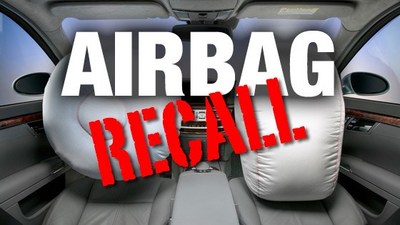U.S. DOT Announces National Recall
of Takata Air Bags
Washington DC May 19, 2015; The National Highway Traffic Safety Administration will organize and prioritize the replacement of the defective air bag inflators that were used in nearly 34 million vehicles. NHTSA will also be coordinating with Takata and automakers that used the defective inflators in their vehicles, to ensure the American public receives information regarding these recalls as it becomes available.
At the insistence of the U.S. Department of Transportation, Takata has determined that a defect exists in some of its air bag inflators. Takata has agreed to a national recall of certain types of frontal driver and passenger side air bag inflators used in vehicles manufactured by BMW, Chrysler, Daimler Trucks, Ford, General Motors, Honda, Mazda, Mitsubishi, Nissan, Subaru and Toyota. These inflators were made with a propellant that can degrade over time and has led to ruptures that have been blamed for six deaths worldwide. The action expands the number of vehicles to be recalled for defective Takata inflators to nearly 34 million.
NHTSA is waiting for the automakers to supply a complete list of affected vehicles. As this information becomes available, NHTSA will update this site to provide the American public with this information.
Once manufacturers identify which vehicles are affected, use NHTSA’s VIN search tool to confirm whether your individual vehicle is under recall, and search by VIN on a specific vehicle-maker's site. It’s important to check periodically because it’s possible your VIN might not be entered into a manufacturer’s system for several weeks after a recall is first announced. If your vehicle is affected, follow-up with the manufacturer to get interim guidance and get your vehicle fixed as soon as parts are available.
 |
Takata files defect reports, enters Consent Order; NHTSA to coordinate remedy program
WASHINGTON May 19, 2015; U.S. Transportation Secretary Anthony Foxx today announced that at the Department’s insistence, air bag manufacturer Takata has acknowledged that a defect exists in its air bag inflators. Takata has agreed to a national recall of certain types of driver and passenger side air bag inflators. These inflators were made with a propellant that can degrade over time and has led to ruptures that have been blamed for six deaths worldwide. The action expands the number of vehicles to be recalled for defective Takata inflators to nearly 34 million.
Secretary Foxx also announced that the Department’s National Highway Traffic Safety Administration (NHTSA) issued a Consent Order to Takata. The Consent Order requires the company to cooperate in all future regulatory actions that NHTSA undertakes in its ongoing investigation and oversight of Takata. In addition, NHTSA announced its intent to begin a formal legal process to organize and prioritize the replacement of defective Takata inflators under the agency’s legal authority.
“Today is a major step forward for public safety,” Secretary Foxx said. “The Department of Transportation is taking the proactive steps necessary to ensure that defective inflators are replaced with safe ones as quickly as possible, and that the highest risks are addressed first. We will not stop our work until every air bag is replaced.”
The actions expand regional recalls of Takata passenger-side inflators, currently limited to areas of high absolute humidity, to nationwide recalls involving more than 16 million vehicles. They also expand the current nationwide recall of driver-side inflators to more than 17 million vehicles. It’s anticipated that the remedy of vehicles will be prioritized based upon risk, with the vehicles that present the greatest risk in terms of age and geographic location to be serviced first.
“From the very beginning, our goal has been simple: a safe air bag in every vehicle,” said NHTSA Administrator Mark Rosekind. “The steps we’re taking today represent significant progress toward that goal. We all know that there is more work to do, for NHTSA, for the auto makers, for parts suppliers, and for consumers. But we are determined to get to our goal as rapidly as possible.”
The Department has established a new website, www.SaferCar.gov/RecallsSpotlight, to provide regular updates on the status of this and other recalls and of NHTSA’s investigation.
Testing and investigation by Takata, auto manufacturers, and independent researchers have not yet established a definitive root cause of the inflator malfunctions. NHTSA’s analysis of test results and engineering reports from independent organizations points to moisture infiltrating the defective inflators over extended periods of time as a factor.
Over time, that moisture causes changes in the structure of the chemical propellant that ignites when an air bag deploys. The degraded propellant ignites too quickly, producing excess pressure that causes the inflator to rupture and sends metal shards into the passenger cabin that can lead to serious injury or death.
The agency already has held informal discussions with auto makers and parts suppliers in an effort to coordinate one of the largest and most complex product recalls in history. NHTSA also plans to issue notice of intent to open a proceeding that would coordinate the remedy program for Takata inflators in order to address the highest risks quickly.
◾NHTSA’s microsite on Takata recalls
◾View the consent order ◾Takata defect notifications: 15E-040 | 15E-041 | 15E-042 | 15E-043



